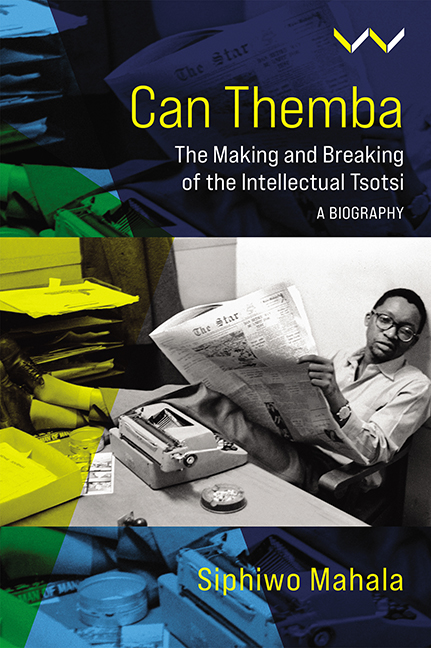Book contents
- Frontmatter
- Dedication
- Epigraph
- Contents
- List of Illustrations
- Acknowledgements
- Introduction
- PART I Death and Birth of a Scribe
- PART II ‘Live Fast and Die Young’
- PART III The ‘Intellectual Tsotsi’
- PART IV Dances with Texts: Writing and Storytelling
- PART V A Writer’s Immortality
- Postscript: The Three Burials of Can Themba
- Notes
- Bibliography
- Index
8 - Destruction and Demise
Published online by Cambridge University Press: 26 May 2022
- Frontmatter
- Dedication
- Epigraph
- Contents
- List of Illustrations
- Acknowledgements
- Introduction
- PART I Death and Birth of a Scribe
- PART II ‘Live Fast and Die Young’
- PART III The ‘Intellectual Tsotsi’
- PART IV Dances with Texts: Writing and Storytelling
- PART V A Writer’s Immortality
- Postscript: The Three Burials of Can Themba
- Notes
- Bibliography
- Index
Summary
I have heard much, have read much more, of the Will to Live; stories of fantastic retreats from the brink of death at moments when all hope was lost … But the Will to Die intrigues me more … I have often wondered if there is not some mesmeric power that fate employs to engage some men deliberately, with macabre relishment, to seek their destruction and to plunge into it.
Can Themba — The Will to Die (1985 [1972]), 62It was Sylvester Stein who poignantly described Can Themba as having ‘died of a broken heart’.While the autopsy on Themba’s body revealed that he had died of coronary thrombosis, regardless of the official cause of death, the lifeless body that was carried out of that room in Manzini had begun dying many years before. The 8th of September 1967 marked the culmination of a downward spiral in a destructive journey that had begun when he joined Drum in 1953 – perhaps even before then.
The apartheid government had systematically driven him out the classroom, and, as a journalist in the line of duty, his mind was battered both by police brutality and Bible-thumping Christians. As Lewis Nkosi puts it, ‘Back in the office they wrote up these grim stories of farm labour brutalities, police torture and township riots in a cool sober prose in which they permitted themselves the luxury of a laugh.’
It was against this backdrop that Themba had to find a moment to live, to cope with the suffering of being black in apartheid South Africa, ways of relaxing and dealing with stress.
His own writings, reflections by his friends and colleagues from this period, as well as the anecdotes shared by some of his companions in the interviews reveal many elements that very likely contributedto his personal destruction. There is a shift over time in Themba’s writing, from the perspective of an observer presenting his opinions (as he does in his journalistic piece ‘Let the People Drink’) to essays and stories where he becomes the subject of his own narrative, and candidly describes his own relationship with alcohol. The trajectory he himself describes – reliance on alcohol even as his health deteriorated – echoes the dominant views of other writers when they tell the story of Can Themba.
- Type
- Chapter
- Information
- Can ThembaThe Making and Breaking of the Intellectual Tsotsi, a Biography, pp. 82 - 101Publisher: Wits University PressPrint publication year: 2022



